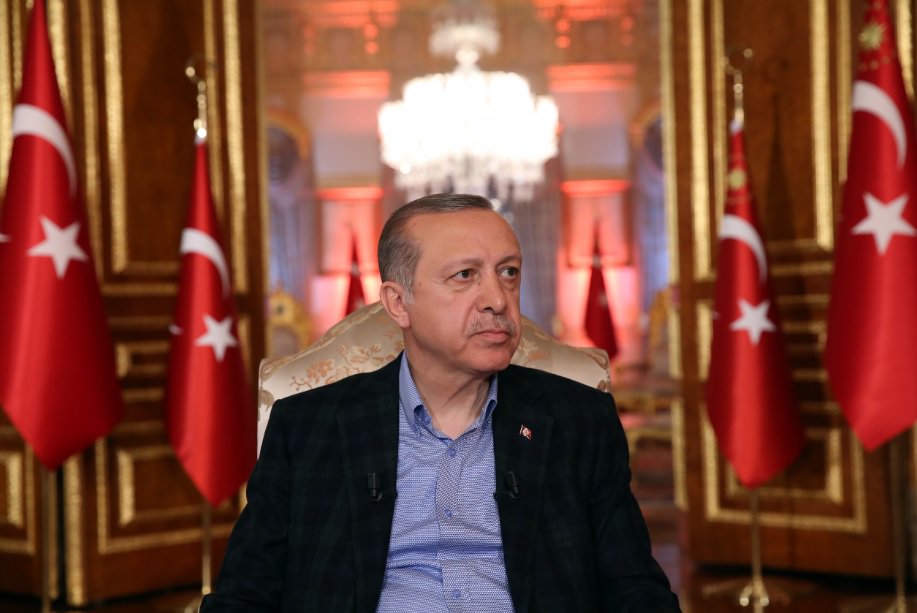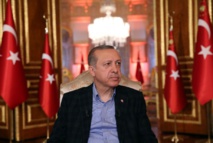There are only two contenders: Germany and Turkey.
It's likely that "the beautiful game" will be discussed when Erdogan, once a semi-professional football player, and German Chancellor Angela Merkel, an ardent fan, meet on Friday.
Whereas two years back it seemed like it was game over for Germany and Turkey - amid Erdogan's increasingly authoritarian rule and Turkey's crackdown after a failed coup in 2016, in which German nationals were also swept up - the NATO partners are now trying to mend their long estrangement.
The two-day state visit by Erdogan, who accused Germany of "Nazi practices" after Berlin blocked rallies for expatriate voters by Turkish politicians ahead of a controversial referendum in Turkey, marks a dramatic rapprochement between the countries.
Turkey is reaching out to several European countries amid a diplomatic and trade row with the United States that has escalated over the imprisonment of a Christian pastor and has triggered a currency crisis.
Germany is concerned that an economic meltdown in Turkey could spill over into Europe, jeopardize a landmark deal on refugees and undermine the NATO military alliance's unity, with Ankara already cozying up to Moscow.
The European Central Bank has expressed concerns about the exposure of eurozone banks - especially in Spain, Italy and France - to the economic turmoil in Turkey.
While both sides have indicated that Ankara will not be asking Berlin for financial assistance, Merkel has said that an economically prosperous Turkey was also in Germany's interest.
"We should not expect a miraculous outcome from this visit," Turkish economist Mustafa Sonmez told dpa. "Both sides need each other for certain reasons."
He said the war in Syria, and particularly the situation in Idlib - the opposition bastion in north-western Syria where Turkey and Russia reached a surprise deal in the face of an imminent invasion by the Syrian regime - will dominate the talks.
"Germany will try to make a friendly impression during the visit, with plans to contain the refugee issue with Turkey's help on their minds," he added.
Also on the agenda are investment opportunities, German nationals in Turkish custody and Turkey's bid to join the European Union.
A German man was released Friday from detention in Turkey, reducing to five the number of Germans still being held on what Berlin calls "political grounds."
Erdogan is expected to raise the issue of coup suspects living in Germany. Since 2016, Turkey has asked for 848 searches on German soil for wanted individuals, according to the German Justice Ministry.
Turkish pro-government media say the president could also bring up the activities in Germany of the Kurdistan Workers' Party (PKK), which is designated a terrorist group by Turkey, the EU and the US.
Ilter Turan, a political science professor at Istanbul Bilgi University, said: "Germany is aware Turkey is going through difficult times and that Turkey carries critical importance for NATO. It is, however, not necessarily interested in offering financial support."
Sonmez agreed Germany "will likely shy away from long-term, large projects due to concerns over state guarantees" when it comes to investments.
Finance Minister Berat Albayrak - Erdogan's son-in-law - who last week slashed Turkey's growth forecast for 2019, said a day later in Berlin that he sees a new era beginning in Turkish-German relations.
Yet there is widespread discomfort in Germany about hosting Turkey's first executive president, who is now both head of state and government, with powers likened by the opposition to "one-man rule."
Tens of thousands of people - including journalists, soldiers, academics and civil servants - remain behind bars since the abortive coup and two years of emergency rule.
"Germany, as the leading EU member state, will not refrain from raising concerns regarding waning democratic standards in Turkey," Turan said.
"In addition to German citizens jailed in Turkey, Berlin will stress such critical issues as rule of law, freedom of speech ... it will tell its Turkish counterparts such topics remain an obstacle in making progress regarding EU membership."
Erdogan will be welcomed to Germany with full military honours - and thousands of protesters.
Some opposition lawmakers have threatened to boycott the state banquet hosted by German President Frank-Walter Steinmeier.
While Erdogan is not scheduled to make any public speeches to German-Turks, he will open Europe's largest mosque, in Cologne.
Some 3 million people of Turkish origin call Germany home, and a majority back Erdogan.
The Turkish leader has always been a polarizing figure in Germany, fuelling debate and demonstrations even in absentia.
Last month, supporters and opponents clashed over a 4-metre golden statue of Erdogan. It was quickly removed from Wiesbaden's art festival, whose theme was "Bad News."
-----------------------------------------------------------------------------------------------------------
It's likely that "the beautiful game" will be discussed when Erdogan, once a semi-professional football player, and German Chancellor Angela Merkel, an ardent fan, meet on Friday.
Whereas two years back it seemed like it was game over for Germany and Turkey - amid Erdogan's increasingly authoritarian rule and Turkey's crackdown after a failed coup in 2016, in which German nationals were also swept up - the NATO partners are now trying to mend their long estrangement.
The two-day state visit by Erdogan, who accused Germany of "Nazi practices" after Berlin blocked rallies for expatriate voters by Turkish politicians ahead of a controversial referendum in Turkey, marks a dramatic rapprochement between the countries.
Turkey is reaching out to several European countries amid a diplomatic and trade row with the United States that has escalated over the imprisonment of a Christian pastor and has triggered a currency crisis.
Germany is concerned that an economic meltdown in Turkey could spill over into Europe, jeopardize a landmark deal on refugees and undermine the NATO military alliance's unity, with Ankara already cozying up to Moscow.
The European Central Bank has expressed concerns about the exposure of eurozone banks - especially in Spain, Italy and France - to the economic turmoil in Turkey.
While both sides have indicated that Ankara will not be asking Berlin for financial assistance, Merkel has said that an economically prosperous Turkey was also in Germany's interest.
"We should not expect a miraculous outcome from this visit," Turkish economist Mustafa Sonmez told dpa. "Both sides need each other for certain reasons."
He said the war in Syria, and particularly the situation in Idlib - the opposition bastion in north-western Syria where Turkey and Russia reached a surprise deal in the face of an imminent invasion by the Syrian regime - will dominate the talks.
"Germany will try to make a friendly impression during the visit, with plans to contain the refugee issue with Turkey's help on their minds," he added.
Also on the agenda are investment opportunities, German nationals in Turkish custody and Turkey's bid to join the European Union.
A German man was released Friday from detention in Turkey, reducing to five the number of Germans still being held on what Berlin calls "political grounds."
Erdogan is expected to raise the issue of coup suspects living in Germany. Since 2016, Turkey has asked for 848 searches on German soil for wanted individuals, according to the German Justice Ministry.
Turkish pro-government media say the president could also bring up the activities in Germany of the Kurdistan Workers' Party (PKK), which is designated a terrorist group by Turkey, the EU and the US.
Ilter Turan, a political science professor at Istanbul Bilgi University, said: "Germany is aware Turkey is going through difficult times and that Turkey carries critical importance for NATO. It is, however, not necessarily interested in offering financial support."
Sonmez agreed Germany "will likely shy away from long-term, large projects due to concerns over state guarantees" when it comes to investments.
Finance Minister Berat Albayrak - Erdogan's son-in-law - who last week slashed Turkey's growth forecast for 2019, said a day later in Berlin that he sees a new era beginning in Turkish-German relations.
Yet there is widespread discomfort in Germany about hosting Turkey's first executive president, who is now both head of state and government, with powers likened by the opposition to "one-man rule."
Tens of thousands of people - including journalists, soldiers, academics and civil servants - remain behind bars since the abortive coup and two years of emergency rule.
"Germany, as the leading EU member state, will not refrain from raising concerns regarding waning democratic standards in Turkey," Turan said.
"In addition to German citizens jailed in Turkey, Berlin will stress such critical issues as rule of law, freedom of speech ... it will tell its Turkish counterparts such topics remain an obstacle in making progress regarding EU membership."
Erdogan will be welcomed to Germany with full military honours - and thousands of protesters.
Some opposition lawmakers have threatened to boycott the state banquet hosted by German President Frank-Walter Steinmeier.
While Erdogan is not scheduled to make any public speeches to German-Turks, he will open Europe's largest mosque, in Cologne.
Some 3 million people of Turkish origin call Germany home, and a majority back Erdogan.
The Turkish leader has always been a polarizing figure in Germany, fuelling debate and demonstrations even in absentia.
Last month, supporters and opponents clashed over a 4-metre golden statue of Erdogan. It was quickly removed from Wiesbaden's art festival, whose theme was "Bad News."
-----------------------------------------------------------------------------------------------------------









 Home
Home Politics
Politics











